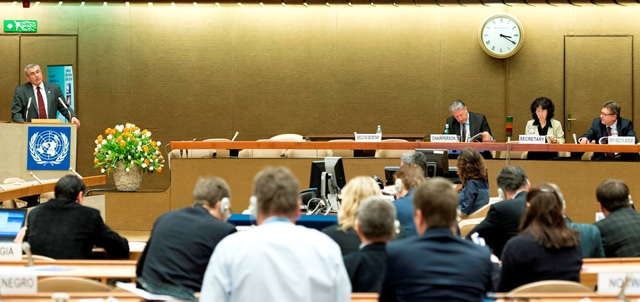
At its 65th session, held from 9 to 11 April at the Palais des Nations in Geneva, the United Nations Economic Commission for Europe (UNECE) adopted the outcome document of the review of the 2005 UNECE reform, which defines the strategic priorities for UNECE’s work for the coming years.
The high-level debates were centred on two issues that are most pertinent to the current development debate and are at the core of UNECE’s activities and member States’ priorities:
1. Follow-up to Rio+20 and post 2015 development agenda.
Some of the main points arising from the discussions, the summary of which will serve to inform the global processes, in particular the high-level meeting of the General Assembly in September 2013, were:
- Messages in the Rio+20 outcome document “The Future we want” provide a sound basis for further work on achieving sustainable development. Next steps include creating a set of Sustainable Development Goals (SDGs), beginning to address the financing needs of developing countries, and creating a range of new partnerships.
- the UNECE region’s diversity in terms of the level of development, the range of economic models, climatic conditions, natural resource endowments and the overall challenges facing each country, need to be recognized in any policy framework as there is no ‘one size fits all’. In addition, this diversity can act as a laboratory for testing different approaches towards addressing these challenges.
- the need to eliminate or reduce fossil fuel subsidies was highlighted as a quick policy change that can have immediate impact by changing consumer behaviour.
As regards the sustainable development institutional set up:
- Delegations stressed that the new high-level political forum (HLPF) currently under development should take into account the lessons learned from the Commission en Sustainable Development (CSD). In order to make better use of existing United Nations processes and institutions, delegations called for the HLPF to serve as a dynamic platform directly linked with ECOSOC.
- Sustainable development goals (SDGs) should be global in nature and universally applicable to all countries, limited in number, action-oriented and easy to communicate. However, some flexibility in the definition of indicators will be required to take into account regional and national circumstances.
- The regional commissions should assume an active and strong role in both the HLFP and SDGs processes, also acting as a “conductor” between global and national levels.
2. Economic developments and challenges in the UNECE region
During the discussion on the “The role of innovation in creating a dynamic and competitive economy”, some key points made included:
- Innovation has acquired heightened importance in current economic circumstances as a way to improve productivity and competitiveness, and overcome tight budgetary constraints.
- Greening the economy is a large-scale structural transformation that requires a regulatory and policy environment that encourages innovation in multiple sectors.
- Successful innovation requires collaboration between the public and private sectors, and between academia and industry.
There were several proposals to strengthen the role of UNECE on innovation, in particular regarding issues such as the creation of mechanisms to facilitate cross-border policy learning and the exchange of good practices on eco-innovation, the promotion of small and medium-sized enterprises and the linkages between standard- setting and innovation.
The results of this panel discussion will serve as regional input to the 2013 ECOSOC Annual Ministerial Review whose theme is “Science, technology and innovation, and the potential of culture, for promoting sustainable development and achieving the MDGs”.
New bureau
The Commission elected its new Bureau, with the Netherlands as Chair (Ambassador Roderick van Schreven, Permanent Representative of the Kingdom of the Netherlands to the United Nations Office and other international organizations in Geneva), and Switzerland and Turkmenistan as Vice-Chairs (Ambassador Remigi Winzap, Permanent Representative of Switzerland to the World Trade Organization (WTO) and to the European Free Trade Association (EFTA); and Ambassador Esen Aydogdyev, Permanent Representative of Turkmenistan to United Nations Office and other international organizations in Geneva).
All delegations paid tribute to the outgoing Chair, Ambassador Zvekic of Serbia, and Vice-Chairs, Ambassadors Manor of Israel and Ciobanu of Romania, for the leadership demonstrated over the last two years in the negotiations on the outcome document of the review of the 2005 UNECE reform.
The Executive Secretary stressed that this 65th session was of particular relevance since it constituted the regional contribution to global processes led by ECOSOC and the UN General Assembly. The 65th session strengthens trust and confidence amongst member States and between member States and the Secretariat, he said.
Among other decisions, the Commission also decided that the Timber Committee be renamed “Committee on Forest and Forest Industry” in order to better reflect its current focus and tasks.
The 66th session of the Commission will be held in 2015.
The documents of the 65th session are available at: http://www.unece.org/commission/2013/65th_index.html